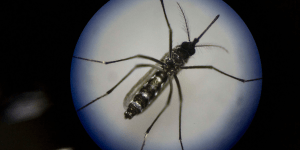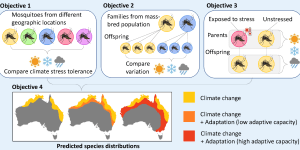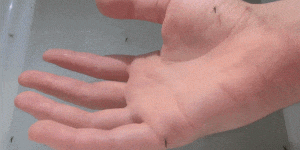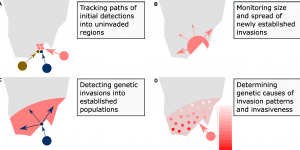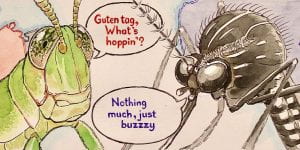Tag: mosquitoes
-
Are you a mosquito magnet? Here’s why and what you can do about it
Dr Perran Stott-Ross and Holly Hyojung Kang This article was first published on Pursuit. Read the original article. Mosquitoes are some of the most effective hunters on the planet. They can track you down at great distance by sniffing out the air you breathe. Once they find exposed skin, they use their needle-like proboscises to […] -
When your dream comes true…
By Miriama Pekľanská As my stay comes to an end, I would like to share a few words about myself and how I fulfilled my dream of coming to Australia to complete my three-month PhD internship with the Pest & Environmental Adaptation Research Group (PEARG). I am from a little village near the beautiful city […]blogs.unimelb.edu.au/pearg/2024/03/21/when-your-dream-comes-true
-
Scientists and government agencies are targeting mosquitoes with bacteria
by Nancy Endersby-Harshman and Ary Hoffmann This article was first published on Pursuit. Read the original article Dengue fever is one of the most common tropical diseases in the world, affecting several million people every year. It is transmitted by mosquitoes, particularly a species known as Aedes aegypti, the yellow fever mosquito. Dengue is a […] -
The breeding trap targeting Melbourne’s growing mozzie problem
Véronique Paris, Liam Ferguson, Nicholas Bell and Ary Hoffmann Banner: Marianne Coquilleau Mosquito-borne diseases like dengue and Japanese encephalitis may feel like far-distant nightmares for many Victorians. Here, the warmer summer months coinciding with the mosquito season are more synonymous with backyard BBQs and backyard cricket than the smell of tropical strength repellents and mosquito […]blogs.unimelb.edu.au/pearg/2024/02/01/the-breeding-trap-targeting-melbournes-growing-mozzie-problem
-
Q&A: Victoria’s monster mosquito explosion
By Véronique Paris, Nick Bell and Professor Ary Hoffmann This article was first published on Pursuit. Read the original article. It’s evening and you’re just starting to relax after a hectic day. Just as you do, you hear the unmistakable high whine of a circling mosquito. It’s something most of us are used to in […]blogs.unimelb.edu.au/pearg/2022/11/24/qa-victorias-monster-mosquito-explosion
-
New DECRA projects coming soon! 1/2
Predicting the future threat of mosquitoes under climate change – Perran Stott-Ross Mosquitoes are major global pests, transmitting harmful pathogens to humans and livestock and causing significant nuisance biting. Climate change will lead to unprecedented temperature increases in Australia, shifting the habitats that are suitable for mosquitoes. Insects are capable of rapid evolution, but we […]blogs.unimelb.edu.au/pearg/2022/09/27/new-decra-projects-coming-soon-1-2
-
Dengue-blocking mosquitoes here to stay
This article was first published on Pursuit. Read the original article. Dr Perran Stott-Ross Story Producer: Nerissa Hannink Dengue fever and other mosquito-borne diseases remain a massive threat to human health and wellbeing. Urbanisation and climate change are likely to increase this threat as established mosquitoes spread to new environments and gain a foothold. Eradicating […]blogs.unimelb.edu.au/pearg/2022/04/12/dengue-blocking-mosquitoes-here-to-stay
-
Male mosquitoes don’t want your blood, but they still find you very attractive
Original article published in The Conversation The Conversation Perran Ross, The University of Melbourne The whine of the mosquito is unpleasant and often inescapable outdoors on summer evenings. Mosquitoes track you down from tens of metres away by sensing carbon dioxide in the air you breathe out. Within seconds, they home in on exposed skin […] -
Improving mosquito control strategies with population genomics
Words: Tom Schmidt When researchers want to investigate evolutionary processes like adaptation and dispersal, they frequently make use of population genomic methods. Population genomics uses DNA data from across an organism’s entire genome – that is, across all of that organism’s DNA. This DNA data can be compared with DNA from other organisms, which can […]blogs.unimelb.edu.au/pearg/2021/06/28/improving-mosquito-control-strategies-with-population-genomics
Number of posts found: 33


